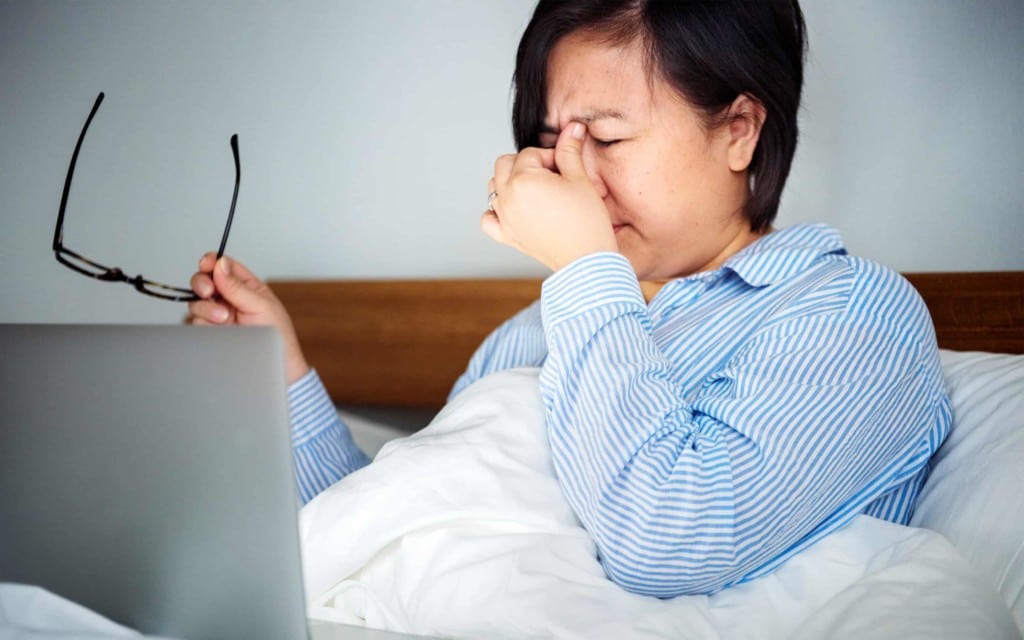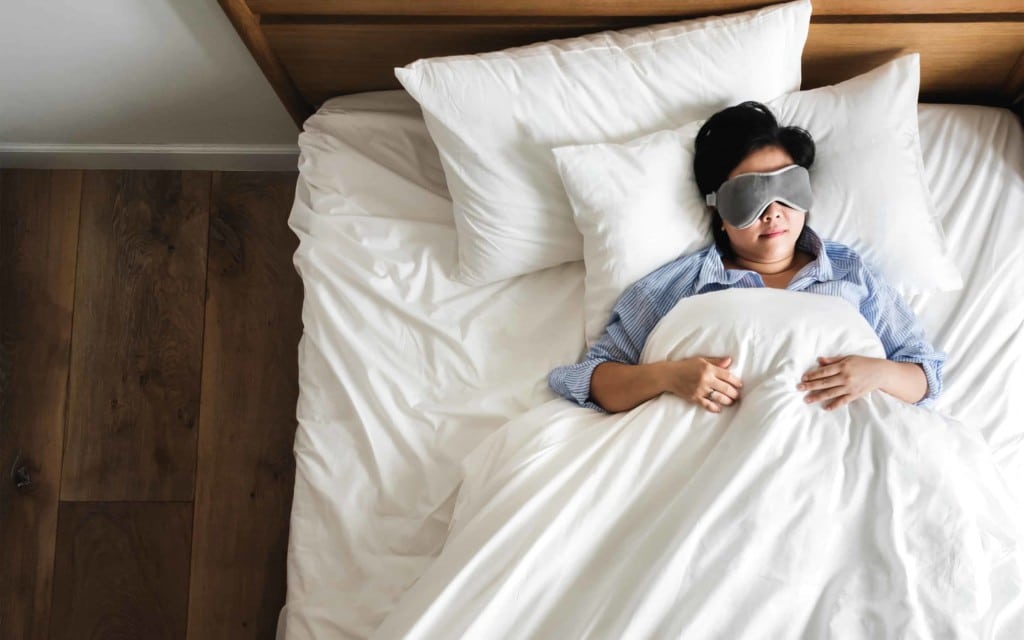If you’ve ever had a night of rough sleep before, then you’ll know it usually leads to a groggy morning.
The effects of sleep deprivation are often immediately apparent, demonstrated in your bleary eyes, gaping yawns, and vacant stare. However, sleep deprivation could be doing a lot more than just making you a temporary zombie for the day.
Studies into the long term effects of sleep deprivation suggest that persistent wakefulness could heighten your risk of everything from weight gain to heart attacks and strokes.
The negative effects of sleep deprivation are costing the UK around £40 billion each year in lost productivity, poor health, and absences from work.
As much as we like to tell ourselves that we can “get by” on less sleep when we want to stay up for yet another Netflix marathon, the apparent impact of lack of sleep indicates that we’re not as good as doing without slumber as we’d think.
A consistent sleeping pattern is what helps us to remember and process information, think clearly and make valuable decisions. When we don’t get enough high-quality sleep, our brains executive functioning is severely impaired. We go into “autopilot” mode and stop thinking correctly.
If you’ve ever wondered: “What can lack sleep do to you?” read on…

The adverse effects of sleep deprivation: An introduction
Let’s start with the basics.
Everyone needs a certain amount of sleep each night. Some people need more rest than others, but sleep deprivation occurs when you’re not getting enough sleep to feel alert and well-rested during the day.
Sleep deprivation has officially been classified as insomnia disorder (DSM-5), experts consider it to be a wide-spread problem affecting people all over the world.
The effects of sleep deprivation aren’t limited to bags under your eyes and excessive yawning. When you’re tired, your decision-making skills are impaired, as are your cognitive functioning processes. Drowsy drivers contribute to $56 billion in motor accidents each year.
What’s more, long term sleep deprivation can cause a number of life-altering ailments over time, including an increased risk of cardiovascular disease, higher levels of anxiety, weight gain, and increased sensitivity to pain.
Scientists agree that the effects of sleep deprivation can differ from one person to another. However, no human being can live without sleep. Fail to get the amount of rest you need, and some doctors state the side effects could even be fatal…

Sleep deprivation effects on the brain
The side effects of sleep deprivation have an impact on every part of you, from your heart to your immune system, and even the way your brain functions. Scientists often believe that the effects of sleep deprivation are most focused within the brain.
Usually, the first symptoms of sleep deprivation will be cognitive in nature. For instance, you might find that you’re struggling with creativity or problem solving after a bad night’s sleep. Alternatively, your response to stimuli might be sluggish. You might not be able to process information as quickly and completely as you usually would.
According to studies, our reaction times after 18 hours without sleep are three times longer than usual. That’s about the same as your reaction times would be if you were drunk. From hour 18 of sleep deprivation onwards, your spatial awareness, mathematical, and decision-making skills begin to suffer.
As your mind begins to process things more slowly, sleep deprivation effects on the brain also mean your ability to form memories will start to deteriorate too. Your capacity to create new memories may shut down completely, meaning you forget everything you did the day before.
If you’re awake for longer than 24 hours in a row, your brain will begin to try and force sleep on you. This often means you end up going into sessions of “microsleep.” Although you appear to be awake, with your eyes open, your brain literally just goes to sleep for a few seconds at a time. Your mind goes on autopilot, and you realize you haven’t heard what someone has been saying to you at work, or discover you’ve missed your exit.
Microsleeps might not seem particularly dangerous at first, but they can be more problematic than they seem. If you fall into a microsleep when you’re driving, cooking, or dealing with dangerous machinery, then you won’t have the reaction time you need to respond to danger.
The effects of sleep deprivation on the brain get even worse when you’ve been up for 35 hours or more. When that happens, your emotional mind begins to act irrationally. Your amygdala will be around 60% more reactive to negative experiences and stimuli, which means you can’t manage your emotions properly, or understand experiences.
Stay up for more than 48 hours in a row, and your brain will start to lose its grasp on reality — that means hallucinations become common.
Many people who are suffering from the effects of sleep deprivation lasting over 48 hours start to experience symptoms similar to psychosis. You might find that you can’t connect properly to reality, or you start to become violent based on your emotions.
The effects of sleep deprivation on the brain are so significant that they actually cause the cells in your brain to begin breaking down.

The destructive effects of sleep deprivation on the brain
You might be wondering why the short term effects of sleep deprivation and the long-term repercussions are so significant when it comes to the brain and mental functioning. Scientists believe that it has something to do with the metabolic functioning of the brain.
When your brain is working over-time, there is a build up of toxic chemicals. It’s a bit like when you work out and your muscles build up lactic acid, which causes them to hurt.
When you’re awake, you’re constantly “working out” your brain. This is particularly true if you’re doing things that can harm the brain, like drinking alcohol.
Scientists have said that neurotoxic substances could accumulate in the brain through the day, and need to be cleaned out during sleep at night. Experts believe that the build up caused by consistent wakefulness is very similar to low-level brain damage. The more your brain isn’t allowed to clear out neurotoxins and recover, the more it deteriorates.
The side effects of sleep deprivation on the brain may be so significant, that they could be contributing to various psychiatric conditions, according to some studies. Sleep problems contribute to the development of issues like anxiety and depression and can reduce the efficacy of treatment for those disorders too.
Additionally, research conducted recently into the effects of sleep deprivation found that not getting enough sleep could lead to the microglial cells and astrocytes in the brain becoming overactive. While these cells would usually take care of cleaning out damaged brain tissue, they can cause damage when they do more cleaning than necessary. In the long term, the result could be an increased risk of cognitive conditions like Alzheimer’s disease.

The physical effects of sleep deprivation
The answer to the question: “What are the effects of lack of sleep?” is clearly a complicated one.
Crucially, the impact of lost sleep isn’t just significant for your brain — it is a serious problem for your body too. Doctors and professionals recommend we get between 7 and 9 hours of sleep every night.
If you’re not getting the right amount of sleep each night, then your mental abilities will suffer, but your organ systems will be harmed too.
Respiratory system: We know your breathing can affect your sleep in the form of disorders like sleep apnea. However, your lack of sleep could be affecting your breathing too. Sleep deprivation leaves the body more vulnerable to respiratory infections like the common cold. It can also make existing diseases and respiratory conditions worse.
Digestive system: Along with not exercising and eating too much, sleep deprivation is also one of the most common risk factors for becoming obese or overweight. Sleep affects the levels of hunger hormones like ghrelin and leptin in the body. When you don’t have the right levels of these hormones in your system, you’re encouraged to eat more.
Motivation: To stay healthy physically, we need to exercise regularly and get a lot of movement into our daily routines. However, a lack of sleep can make you feel too fatigued to exercise. Over time, a reduced activity could mean you begin to gain weight or suffer from other conditions caused by limited activity levels.
Heart: Sleep affects the processes that are responsible for keeping your blood vessels and heart healthy. Your sleep will impact your blood pressure levels, blood sugar and inflammation levels. It also plays a vital role in the ability your body has to heal. People who don’t get enough sleep are therefore more likely to suffer from conditions like heart attacks and strokes.
Endocrine system: Your endocrine system is responsible for hormone production and regulation. You can only produce the right hormones if you get enough sleep. Lack of sleep can have an impact on the way your pituitary gland releases hormones. For instance, testosterone production requires 3 hours of uninterrupted rest. Low release of growth factors can stop children from growing normally.
Immune system: When you sleep, your immune system produces infection-fighting substances called cytokines to help you stay healthy. Cytokines are helping the immune cells fight off foreign invaders like bacteria and viruses. Long term sleep deprivation can be so detrimental to your immune system that your risk of chronic illnesses like diabetes and heart disease increases.
In some cases, a lack of sleep can even change how you behave on a fundamental level. When you have a sleepless night, you generally feel more hungry the next day. That’s because your levels of the hunger hormone ghrelin will usually be much higher. When you’re sleep-deprived, you don’t just want to eat more, you want to get immediate rewards from the food you’re eating.
A study produced by the American Academy of Sleep found that unhealthy foods are often seen as more satisfying and rewarding for those who were suffering from sleep deprivation. Even if you’re the sort of person who only eats healthy foods, the physical effects of sleep deprivation could prompt you to seek out fattening substances to help fill the energy gap in your body.

What does lack of sleep do to you short term?
Sleep is something that no human being can survive without.
Unfortunately, issues ranging all the way from sleep anxiety to chronic sleepwalking can keep us awake at night, making sleep deprivation increasingly common. When you’re unable to get the amount and quality of sleep that your body needs to thrive, the results are often immediate.
You may find that you wake up feeling exhausted, overwhelmed, and emotional. What’s more, there’s a good chance that you won’t be able to perform at your best throughout the day.
The short term effects of sleep deprivation often have an impact on how we behave the day after we failed to get enough sleep. For instance, you might find that you can’t focus on your work, and you begin to repeat yourself more often when you’re talking to your colleagues, friends and family members.
What’s more, you won’t be able to absorb a lot of new information, so if you’re a student at school or college, your day after a night of sleep deprivation could end up being a total write-off.
After a nightmarish night of limited sleep, your mood will immediately take a nosedive. Getting enough sleep is crucial to making sure that your brain has the resources it needs to regulate your emotions.
You won’t just feel cranky and irritable when your alarm goes off in the morning — you’ll have a harder time responding to other emotional stimuli too. This could mean you struggle to maintain your relationships with loved ones because you’re more reactive to stress than you usually are.
The short term effects of sleep deprivation can also affect the way you look. You might have noticed in the past that when you get up after a late-night Netflix binging session, your skin looks pasty and dried out.
You might have dark circles under your eyes, and your wrinkles and lines will appear more significant. Constantly skipping out on sleep can lead to premature ageing and sagging in the skin. Cortisol, the stress hormone that ramps up when you suffer from lack of sleep, breaks down collagen. Collagen helps give your skin structure and elasticity and keep you looking young.
You’ll even feel colder than usual because your body won’t have had time to get into the right cycle for temperature regulation.
Your body after a bad night of sleep is actively preparing you for worse health. Your heart begins to suffer from the excess stress on your body, while your appetite goes into overdrive and convinces you to eat more unhealthy foods. Your immune system becomes sluggish and forgets to fight off the diseases that come your way. Your brain’s emotional response puts you on the path for feelings of anxiety, depression, and excess stress.
Overall, the short term effects of sleep deprivation are a perfect storm of panic, discomfort, and bad health.

What are the long term effects of sleep deprivation?
So, we know that the short term effects of sleep deprivation are significant — but what about the long-term impact?
In simple terms — the long term effects of sleep deprivation are terrifying.
Ultimately, your sleep requirements vary depending on your age, your body’s constitution and requirements. However, no-one can survive without a consistent level of sleep. According to one review from 2010, the world record for a person going without sleep is around 11 days.
A lot of people assume that the long-term side effects of sleep deprivation won’t be significant, because they’ll just make up for their sleep debt by sleeping in when they have the time. However, the truth is that sleep deprivation can be fatal in certain circumstances.
There’s a rare condition called fatal familial insomnia(FFI) which occurs as a result of a gene mutation. This means that the brain is no longer able to regulate sleep. FFI is a rare genetic degenerative brain disorder. It is characterized by an inability to sleep that may be initially mild, but progressively worsens, leading to significant physical and mental deterioration.
Studies in mice have also found that it’s possible to die from lack of sleep — though scientists have suggested that it would be very difficult for this to happen to a human because eventually you would fall asleep, whether you like it or not.
Of course, simply falling asleep because of the negative effects of sleep deprivation at the wrong time can be fatal too. In 2015, the US police reported 90,000 motor crash incidents caused by sleep deprivation.
Studies are also underway into the potential connection between sleep deprivation and some cancers. The International Journal of cancer found a link between certain types of cancer and irregular waking and sleeping schedules in some women.
This could mean that the more you’re unable to get the right level of sleep each night because of for instance nightshifts, the higher your risk of life-threatening diseases becomes.

What can a lack of sleep do to you?
It’s easy to assume that you can get by on less sleep than you actually need when you’re dealing with a hectic schedule. However, sleep deprivation is a lot more dangerous than many people think.
In the short term, the side effects of sleep deprivation include everything from grogginess and trouble concentrating, to an increased risk of overeating, and a heightened emotional response to stimuli. In the long-term, a consistent lack of sleep could increase your chances of everything from obesity to diabetes and heart diseases.
Sleep deprivation is something that we all need to take seriously in this fast-paced age. If you’re not getting enough sleep, check out our other blogs for some extra help, or visit your doctor!
Siestio. Sleep Matters.
Medical disclaimer
You must not rely on the information provided on our website as an alternative to medical advice from your doctor or other healthcare professionals. For more information read our full disclaimer here.







